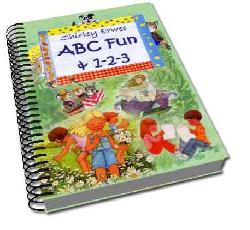| Back to Back Issues Page |
 |
|
Screen Time for Preschoolers October 10, 2016 |
Screen Time for PreschoolersHow Much Screen Time Should Little Kids Have?
I recently received this question from a mom: "I like the idea of unschooling but my challenge at the moment is all my children want to learn is how the iPad works! We live in a technology age so I am torn between the fact that electronics are helpful but also the desire to draw them to other things... So do I leave them to explore this field and give their focus to it or do I distract them with what I think is beneficial?"
This is my reply: There are many unschoolers who would say let them go and explore the iPad thing. I am not a radical unschooler. I don't agree. I feel our kids need some balance in life and they have to realise that too much time with technology is not good for them, for a variety of reasons, mostly physical health - but social and family health too. Screens cause bad posture and they are not good for one's eye-sight. Too much time in front of a screen means there is an opportunity cost - kids are not being active, not playing out doors, not playing with each other etc.
I don't have any fear about my kids not being able to master technology. I really think most of us DO NOT need to worry about that - they seem to discover how everything works in no time at all and they love new apps and new techno-stuff! So, in our home, we set limits for leisure time on screens: no games, watching YouTube etc. during the day but our kids get time on the pc in the evenings. They may use my pc for educational purposes like to watch a maths DVD, practice touch typing or type a lesson or something like that. You have to decide what you think is best for your family and you might even go through a process of testing and tweaking and testing and tweaking until you are comfortable. If one looks at the research coming out, we would probably all do well to err on the side of too little screen time, rather than too much. "When very small children get hooked on tablets and smartphones,they can unintentionally cause permanent damage to their still-developing brains," says Dr. Aric Sigman, an associate fellow of the British Psychological Society and a Fellow of Britain’s Royal Society of Medicine. He says that the very skills that parents would like their children to develop, such as the ability to focus, to concentrate, to lend attention, to sense other people’s attitudes and communicate with them, to build a large vocabulary - all these abilities are harmed, when children spend too much time in front of screens and gadgets.
There is also a growing amount of research and articles published explaining that for optimal learning, young children need a lot of time for free play, using their own imaginations, they need to be outdoors and they need to be climbing and clambering and developing their gross motor skills. This article explains why Kids Need to Move to Learn and this one explains more about what passive entertainment does to kids brains: What Screen Time Really Does to Kids.
Preschool Homeschooling – Do it Right!
Your children only get one childhood, do it right! Click here to download the Preschool Homeschooling Webinar. It is an mp4 of 55.34MB and it should play on most media players.
Developmental Activities1. Gross motor skills Hold your child by the feet while he does a 'wheelbarrow' walk on the floor, supporting his body with his hands. This is an excellent strengthening exercise for the muscles of shoulder girdle. Let him rest every now and then. 2. Fine motor skills Manual dexterity: Let your child pick up small objects such as plastic toys or shapes using clothes pegs. 3. Visual skills Visual analysis: Cut large shapes such as a circle, square and triangle from paper. Then cut them in half and then place all the pieces on the table in front of your child. She must put them together to build the complete shape once more. 4. Auditory skills Encourage your child to combine sounds and actions. When you make a sound like an animal, let him pretend to be that animal. You can also make the sounds of cars and other vehicles. More ideas are frogs (croak and jump), horse (neigh and gallop), an aeroplane, a train, a cat, a mouse, a bird,a chicken etc. 5. Mathematical skills Choose a number and see how many times you and your child can spot it in a day. Look at post box numbers, road signs, address numbers etc. 6. Language and thinking skills Active Language Development: Play the “why?” game with your child, but you both get to ask questions and give answers:
Why do you wear clothes? 7. Faith-building Pick one aspect of your child's character that needs training, such as perseverance, helpfulness (with a good attitude) or generosity (sharing) and make a focused effort to encourage and train your child in that area. Make sure you are setting a good example too. Praise her for her efforts.
Regards Designed for ages 3-6 years, ABC Fun & 1-2-3 is a story-based preschool curriculum with printable alphabet worksheets, weekly lesson plans, easy kids crafts, nursery rhymes and more - all to make learning the ABC fun! |
| Back to Back Issues Page |
